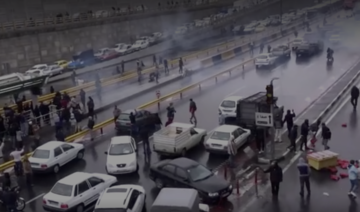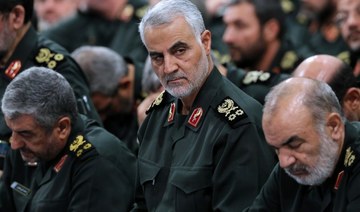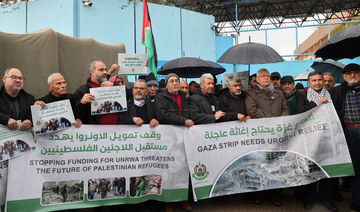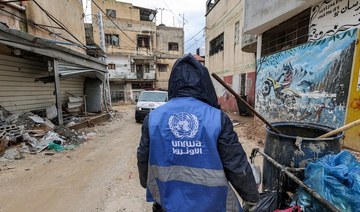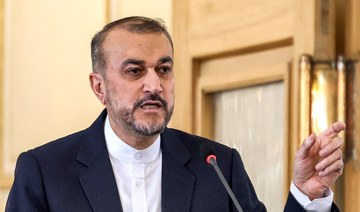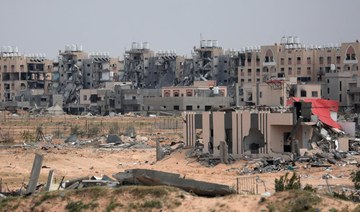VIENNA: The UN's nuclear watchdog said Monday that Iran's stock of heavy water for reactors has surpassed the limit set under its agreement with world powers.
The International Atomic Energy Agency said in a statement that Iran's heavy water production plant was in operation and that its stock of heavy water reserves was 131.5 tonnes, above the 130-tonne limit.
In Vienna, an IAEA spokesperson said: "On 17 November, the Agency verified that the Heavy Water Production Plant (HWPP) was in operation and that Iran's stock of heavy water was 131.5 metric tonnes."
Heavy water is not itself radioactive but is used in nuclear reactors to absorb neutrons from nuclear fission.
Heavy water reactors can be used to produce plutonium for nuclear weapons as an alternative to enriched uranium.
It was the first time the agency has recorded a volume greater than the level agreed upon as part of the Joint Comprehensive Plan of Action (JCPOA) reached in 2015 with Britain, China, France, Germany, Russia, the United States and the European Union.
The US unilaterally withdrew from it last year, after which Iran began reducing its commitments in a bid to win concessions from those still party to the accord.
In Washington Monday, Secretary of State Mike Pompeo said the US will lift sanctions waivers on Iran's Fordow nuclear plant, citing the resumption of uranium enrichment activities at the site already announced by Tehran.
"The United States will terminate the sanctions waiver related to the nuclear facility at Fordow effective December 15, 2019," Pompeo told a news conference.
Earlier this month, the IAEA said that uranium particles had been detected at an undeclared site in Iran.
The report also confirmed that Iran has ramped up uranium enrichment in breach of the 2015 deal, feeding uranium hexafluoride gas into previously mothballed enrichment centrifuges at Fordow, an underground plant south of Tehran.
That allows for the production of the most fissile isotope, Uranium 235.
Since September, Iran has also been producing enriched uranium at a facility in Natanz.
It has exceeded a 300 kilogramme limit on stocks of enriched uranium and has breached a uranium enrichment cap of 3.67 percent.
Iran has always insisted that its nuclear programme is exclusively peaceful and that acquiring nuclear weapons would be contrary to Islamic principles.
Iran's heavy water stock exceeds authorised limit: IAEA
Iran's heavy water stock exceeds authorised limit: IAEA
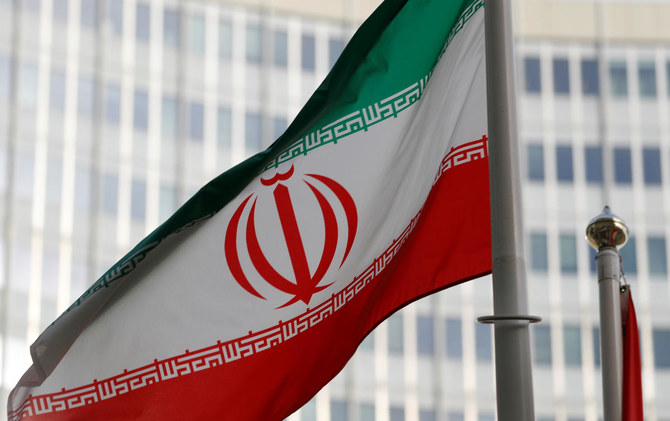
- Iran's heavy water production plant was above the 130-tonne limit
US calls on Iraq to safeguard US troops after new attacks
WASHINGTON: The US military called on Iraq’s government on Tuesday to take steps to safeguard American troops in both Iraq and Syria after failed attacks on Monday by Iran-aligned militia.
“These attacks put coalition and Iraqi personnel at risk. We call on the government of Iraq to take all necessary steps to ensure the safety of US forces in Iraq and Syria against attacks from these groups,” Air Force Major General Patrick Ryder told a news briefing.
“If these attacks continue, we will not hesitate to defend our forces, as we have done in the past.”
White House wants ‘real progress’ before restoring UNRWA funding

- “In terms of our funding of UNRWA, that is still suspended,” Kirby said
- “We welcome the results of this report and strongly support the recommendations in the report“
WAHSINGTON: The White House said Tuesday it would “have to see real progress” before restoring its funding to the UN agency for Palestinians, the main aid agency operating in war-torn Gaza.
The comments from National Security Council spokesman John Kirby came after the US froze aid to the United Nations Relief and Works Agency following accusations by Israel that its staff may have participated in the October 7, 2023, Hamas attacks.
A UN probe is looking into those accusations.
A separate independent review into UNRWA found some “neutrality-related issues” in its much-anticipated report released Monday. It noted Israel had yet to provide evidence for incendiary allegations that staff were members of terrorist organizations.
“In terms of our funding of UNRWA, that is still suspended. We’re gonna have to see real progress here before that gets changed,” Kirby said.
Many donor countries have resumed funding since Israel’s accusations, including Sweden, Canada, Japan, the EU and France — while others, including the United States and Britain — have continued to hold out.
“We welcome the results of this report and strongly support the recommendations in the report,” Kirby said, noting that the United States also faced legal constraints in restarting its funding.
Congress passed a bill signed into law by President Joe Biden last month that blocks US funding until March 2025.
UNRWA, which employs some 30,000 people, began operations in 1950 and provides services to nearly six million people across Jordan, Lebanon, Syria, the Gaza Strip and the West Bank, including East Jerusalem.
The neutrality issues highlighted in Monday’s report included staff sharing biased political posts on social media and the use of a small number of textbooks with “problematic content” in some UNRWA schools.
US sanctions four over ‘malicious cyber activity’ for Iran’s military
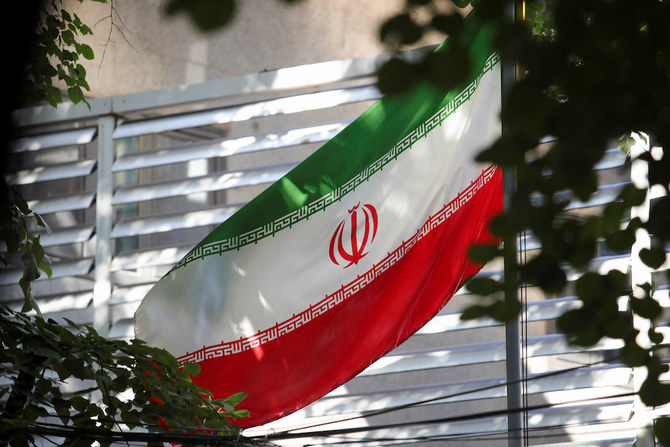
- The individuals and companies were working “on behalf of” Iran’s Islamic Revolutionary Guard Corps Cyber Electronic Command (IRGC-CEC), the Treasury said
- Tuesday’s sanctions are the latest to be levied against Tehran by the United States
WASHINGTON: The US ramped up its sanctions against Iran on Tuesday, designating four people and two companies it says were “involved in malicious cyber activity” on behalf of the country’s military.
“These actors targeted more than a dozen US companies and government entities through cyber operations, including spear phishing and malware attacks,” the US Treasury Department said in a statement.
The individuals and companies were working “on behalf of” Iran’s Islamic Revolutionary Guard Corps Cyber Electronic Command (IRGC-CEC), the Treasury said.
“Iranian malicious cyber actors continue to target US companies and government entities in a coordinated, multi-pronged campaign intended to destabilize our critical infrastructure and cause harm to our citizens,” the Treasury’s undersecretary for terrorism and financial intelligence Brian Nelson said in a statement.
“The United States will continue to leverage our whole-of-government approach to expose and disrupt these networks’ operations,” he added.
Tuesday’s sanctions are the latest to be levied against Tehran by the United States and its allies for supporting anti-Israel proxies in the Middle East and for providing military support for Russia’s war in Ukraine.
Last week, the US and Britain announced widespread sanctions against Iran’s military drone program in response to Tehran’s large-scale attack against Israel earlier this month.
That attack came in response to an April 1 air strike on the Iranian consulate in Damascus — widely blamed on Israel — that killed seven members of the Islamic Revolutionary Guard Corps, including two generals.
A day after those sanctions were unveiled, the US fined a Thailand-based firm $20 million for more than 450 possible Iran sanctions violations.
They included processing close to $300 million in wire transfers for a company jointly owned by the National Petroleum Company of Iran.
Alongside the Tuesday’s sanctions, the US Department of Justice and the Federal Bureau of Investigation (FBI) have also indicted the four individuals in question, “for their roles in cyber activity targeting US entities,” the Treasury Department said.
Egypt condemns Israeli human rights violations in Gaza Strip
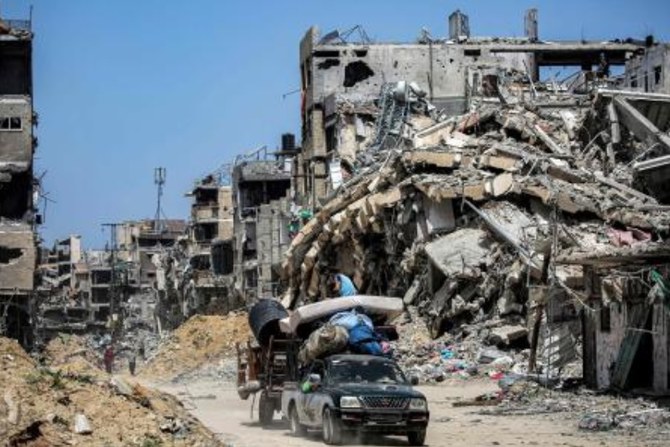
- Egypt said it condemned violations of international law including the targeting of civilians
- Abu Zeid reiterated the need for immediate intervention by the international community to stop such violations
CAIRO: Egypt has condemned the repeated Israeli violations of international law and international humanitarian law in the Gaza Strip.
The Egyptian Ministry of Foreign Affairs said: “It is regrettable and shameful that violations of international law and humanitarian values continue in such a flagrant manner in the 21st century, in full view and hearing of all countries, international organizations, and the Security Council.”
This came during statements made by ministry spokesman Ahmed Abu Zeid regarding the discovery of mass graves in the Nasser Medical Complex in Khan Yunis in the southern Gaza Strip.
Egypt said it condemned violations of international law including the targeting of civilians, displaced persons, and medical teams by Israeli forces.
Abu Zeid reiterated the need for immediate intervention by the international community to stop such violations and to conduct the necessary investigations to hold perpetrators accountable.
He added that the killing, destruction, and violence witnessed in the West Bank over the past few weeks is no less dangerous, further aggravates the crisis, and threatens to escalate tensions across all occupied Palestinian territories.
He called for an immediate halt to the violence and attacks by settlers, protected by Israeli forces, against Palestinian civilians, their property, and homes in the West Bank.
The bodies of over 200 Palestinians, including patients, have been uncovered so far in mass graves at the Nasser Medical Complex in Gaza’s Khan Younis since Saturday, according to media reports.
Hezbollah drones target northern Acre in response to Israeli strikes on Lebanese group
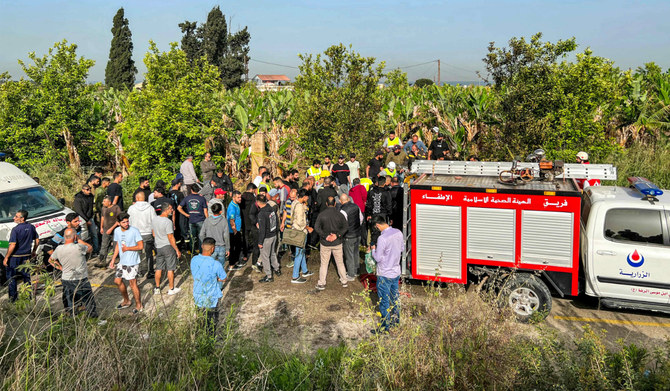
- Israeli media reported that “those present on the beach were evacuated after a Hezbollah drone was intercepted in the skies over Nahariyya and Acre”
- Israeli army had said it killed “two significant terrorists in Hezbollah’s aerial unit”
BEIRUT: Hezbollah forces in south Lebanon on Tuesday launched a combined aerial attack with diversionary and assault drones on Israeli military targets.
The focus of the Lebanese group’s attack was the headquarters of the Golani Brigade at the Shraga barracks, north of the city of Acre.
The attack was described as “a new qualitative strike against an Israeli site,” using drones said to be able to bypass Israeli radar and avoid Iron Dome missiles.
A security source told Arab News that the attack was “a sensitive targeting.” The area struck is more than 15 km from the border with Lebanon.
“This targeting took place in broad daylight while the Israelis were celebrating the Jewish Passover,” the source said.
Hezbollah said it launched the drones “in response to Israeli aggression against the Lebanese town of Aadloun and the assassination of a (Hezbollah) cadre there.”
Videos on social media showed explosions and smoke rising north of the coastal city of Acre, with beachgoers fleeing in all directions.
Israeli media reported that “those present on the beach were evacuated after a Hezbollah drone was intercepted in the skies over Nahariyya and Acre.”
A few hours after Hezbollah’s strike, Israeli warplanes carried out an airstrike on the town of Hanin, 7 km north of Bint Jbeil. It destroyed a two-story family house.
Initial reports said there were two casualties, including a woman, and five were wounded, some seriously, including women and children. The injured were transferred to hospitals.
Meanwhile, an Israeli military drone struck a car between the towns of Adloun and Al-Kharayeb, killing Hussein Ali Azqul, who reports suggested was an engineer working in Hezbollah’s air defense unit.
The group was left mourning a second member, Mohammed Khalil Attiya, from Qana, who died from injuries received a few days ago. The Israeli army described him as a “leader in the Radwan Force (a Hezbollah special unit).”
In ongoing cross-border clashes between Hezbollah and Israeli forces, the former said it had attacked “a gathering of Israeli enemy soldiers in the vicinity of Al-Asi,” to which Israeli fighter jets retaliated with airstrikes on the towns of Blida and Hula.
Israeli airstrikes continued relentlessly on Tuesday night, striking Yaroun and Al-Aishiya as well as other districts in south Lebanon.
The Israeli military also launched flash bombs over villages in the western and central areas, extending to the outskirts of Tyre, and on Tuesday morning fired heavy weapon rounds toward the towns of Naqoura and Jabal Al-Labouneh.



